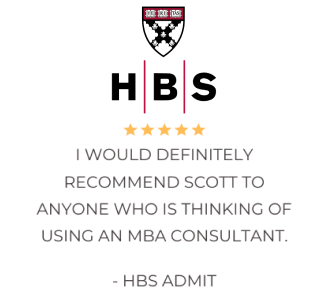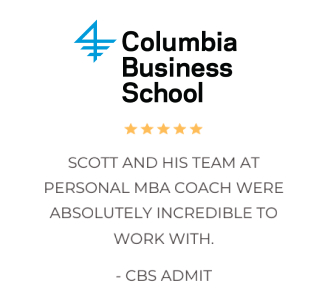Rejections happen to everyone, but this is no reason to give up hope! There are dozens of reasons why you might get rejected, some of which have nothing to do with the quality of your application. Still, following an MBA rejection, you will want to know what you can do better next time — that is where Personal MBA Coach’s Ding Analysis comes in.
This service helps you see places you may have gone wrong, giving you ideas on what to do differently next time. Regardless of the reason, our team is here to help you develop a strategy that works so that you can start your path to success during the next round of applications. Here are some of our top tips for qualified applicants.
1) Broaden Your School List
Top-level schools receive thousands of applications every year, and even if they wanted to admit everyone, they cannot. For better or worse, sometimes acceptance comes down to numbers: Even when you do everything you can to stand out, there may have been too many applicants with a similar profile.
While Personal MBA Coach helps clients from overrepresented backgrounds develop compelling personal stories that stand out, diversity is important to MBA programs. You cannot fill an entire class with former McKinsey, Bain or BCG consultants or investment bankers. This “numbers game” is one of the key reasons we advise candidates to broaden their school lists.
Therefore, we often recommend that applicants expand the scope of their schools. We suggest applying to five to eight schools to give yourself the best opportunity for success. When you work with Personal MBA Coach, we will give you honest feedback about your applications and what your chances are at getting into any school on your list.
2) Maintain Your Goals But Expand on Your Vision
You want to demonstrate to the admissions committee that you are focused and consistent. Instead of developing new goals and changing your priorities to accommodate what you think your target school’s perceptions are, evaluate how clearly you laid out your vision. Was it specific enough? Did you show how you will leave your mark? Did you demonstrate an understanding of the skills needed to achieve these goals?
Even if you answered “yes” to all of these questions, take this opportunity to further describe your vision. Demonstrate how recent, relevant experience has fine-tuned your direction or the capabilities you will need to achieve these goals and how you are better able to prepare for them.
In addition, if you have accepted a new role to better prepare for your goals, explain it carefully and show your path and evolution so you do not seem simply indecisive.
While in some cases it may be necessary to adjust your goals, tread cautiously here. If life or work circumstances necessitate a change, clearly explain how your goals have evolved and the steps you have taken to get closer to them.

3) Focus on School Interaction and Research
One reason you may have been rejected the first time around is questionable interest in the target school. Increased interaction with schools not only will combat any doubts about your sincerity, but it also will show admissions committee representatives that you are committed to and passionate about their programs.
Visit campuses (even if you already have), sit in on classes, meet with current students and attend MBA events. Naturally, there can be too much of a good thing, so be careful to strike a balance between showing passion and being overbearing. Keep in mind that schools face varying importance on school interaction.
4) Look Critically at Your Test Scores
While your test score is not everything, it IS important. This is particularly true of your quantitative score. If you were rejected, compare your score to the school’s average. Though most schools look at the bigger picture these days, you may need to have a certain score to compete with other applicants who have similar accolades.
If you think your GMAT/GRE/EA score may have been a red flag for your target MBA program, consider retaking the GMAT/GRE/EA or switching from one exam to the other. Some candidates perform much stronger on one test vs. another, and schools largely do not have a preference on which test you take. On your second time around, look back at your previous study strategies and see where you can improve. Maybe a new study method or even working with a personal tutor will help you feel more prepared this time.
5) Strive for Balanced Essays
With limited space to paint a picture of who you are and what makes you unique, it is important that you submit balanced essays. If you dwell too much on one aspect of your profile, you undoubtedly will shortchange another. Similarly, for many schools you also need to strike a balance between talking about you and talking about them. For instance, did you adequately discuss classes that you were interested in? Did you share the specific skills you hope to gain on campus? Developing balanced essays is one area that we work on extensively with all applicants, particularly reapplicants.
If you are unsure whether your balance was right, check out our Ding Analysis Services.

6) Evaluate Your Overall Application as a Whole
While it may feel easy to pin your failure on one particular part of your application, ultimately, the big picture is where many people fall short. Evaluate your application as a whole to see where there may be gaps and figure out how to fill them. Asking these questions may help you get started:
- Does your application consistently highlight strengths?
- Does the reader walk away with a clear vision of what sets you apart?
- Is every question fully and thoughtfully answered?
- Are there conflicting portions of your application?
- Do you explain yourself clearly?
7) Improve Your Interview Preparation
Did you receive a lot of interview invitations but were rejected after the interview? Then it is time to hone your interview skills. Whether you work with the Personal MBA Coach team or someone else, you should ensure you have the proper training and practice to ace the interviews once you get the invites.
8) Evaluate Your Letters of Recommendation
While you may not be able to see exactly what your recommenders wrote, you can have a conversation with them to assess their interest and determine whether they are still a good fit for your application. Depending on where you are re-applying, you may need new LORs anyway, and you can always choose to change who writes them.
9) Look for Other Opportunities to Strengthen Your Profile
One of the most important things you can do to strengthen your application when reapplying to business school is to bolster the totality of the candidate “picture” that you present.
Of course, you cannot change your life. But you can take a look at a few key factors that may buoy you the next time around. A little polishing in different areas can amount to a great improvement in your candidacy.
- Take on More Responsibility at Work: While it is generally not advised to make late job changes just prior to applying, you can certainly try to do different things at work to showcase your talent and energy. For example, take on a new project or take on a new responsibility if you are applying for round 2. Evaluate your experience and see where you might be lacking, relative to peers. Regardless of whether you changed jobs or roles, in your reapplicant essay be sure to highlight the major projects you have tackled over the last year, calling attention to any new skills they provided. Think about where your application was weak and be sure to mention accomplishments that allowed you to strengthen these areas.
- Look for Opportunities to Address Any Skill Gaps: Think about where you are weakest and see what you can do now to close these gaps. Is there a course you could take to improve your analytical skills? Perhaps you got an interview but did not get accepted? If so, consider options for improving your presentation and interview skills in advance. Everyone has weaknesses; take the time now to address yours.
- Enhance Your Leadership Experience: Seek out roles and activities at work, home and in your community that can improve your leadership experience and skills.
- Beef Up Your Extracurriculars: Taking on unique extracurricular activities, working with non-profits or taking on an important new cause can demonstrate new passion and conviction in addition to leadership. This too may help edge you over the previous result.

10) Start Far in Advance (If Possible)
All of these steps take time! If you are applying for round 3, Personal MBA Coach will help you prioritize your efforts.
If you are applying next year, start early! Do not put your applications on the back burner until the summer or fall. By starting early for next year, you can take the time to fine-tune your story, rethink your LOR strategy and recommenders, and ensure all aspects of your application work together cohesively.
Start now by developing a calendar for courting your dream schools. Hire a GMAT/GRE tutor (if you are retaking the test). Look at where your essays were weak and think about how you can improve this time around. A rushed application will never be the strongest possible application, so be sure to give yourself plenty of time to do it right!
Work With an Admissions Consultant Today
Every year, Personal MBA Coach helps countless applicants successfully increase their chances of acceptance. Join us today and transform your possibilities.




















